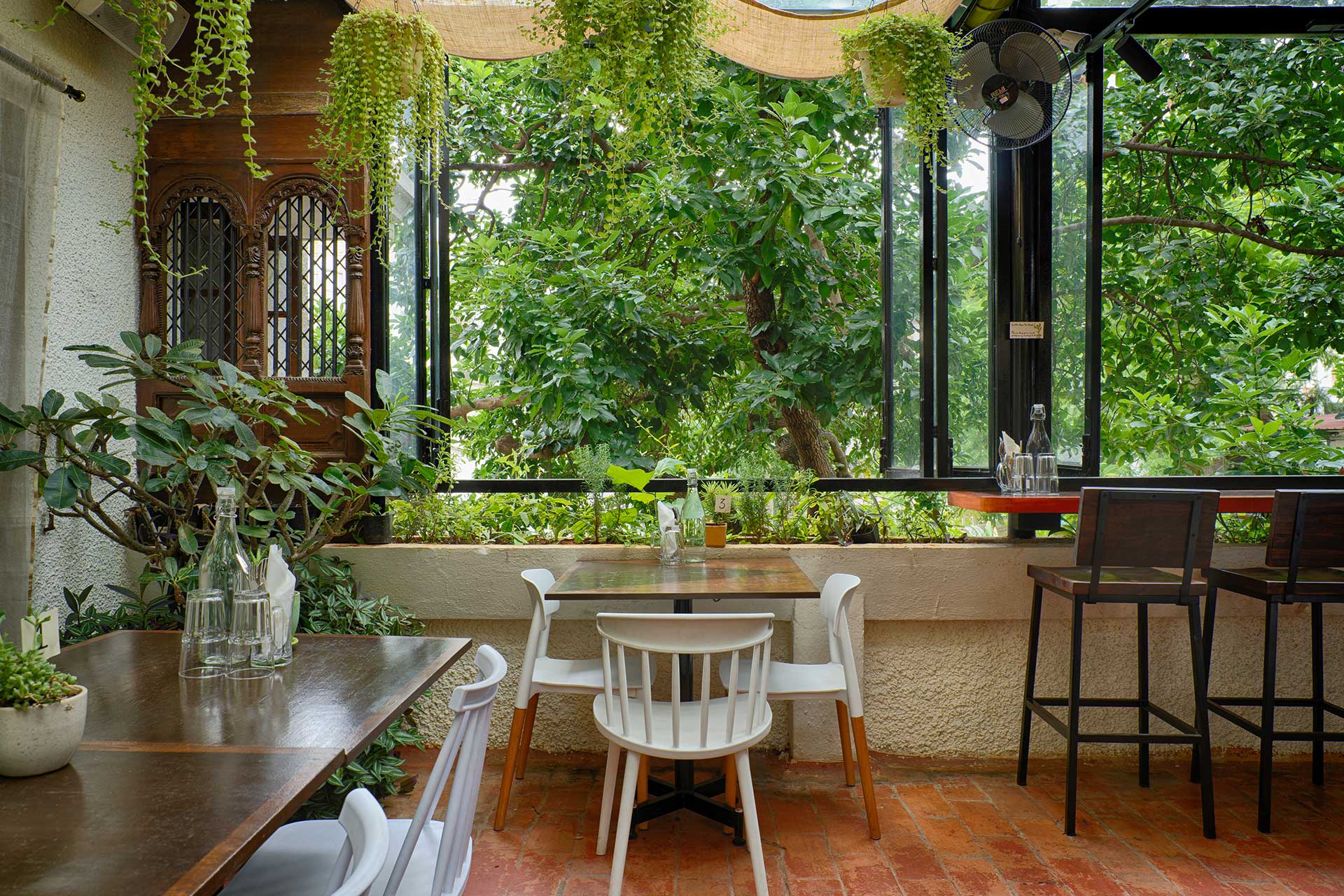On the rooftop of a bungalow, a metal-staircase takes you to the store that opens into a courtyard. Founder Radhika Timbadia wanted to create a sanctuary hide-away from the city lights and traffic
Champaca in Bengaluru
Magnolia champaca is a tree from the botanical family of Magnoliaceae. Native to Southeast Asia, it is famous for its yellow flowers with the fragrance of tea, spices and dried-apricots, compared to orange blossoms. The oil extracted from the flowers is used as an ointment and for aromatherapy. The blossoms are offered at ceremonies in temples across cultures. According to Tibetan beliefs, the Buddha of the next-era will find enlightenment under the flower canopy of the champaca tree. Wildlife and community-based conservationist Radhika Timbadia founded Champaca Bookstore, Library and Cafe, in June 2019, in the metropolitan of Bengaluru in South India.
An independently-owned, women-run bookstore and cafe, Champaca thrives on its community of people. The team takes pride in shaping the space at the store through a list of genres that covers wildlife and ecology, queer stories, feminist writing, politics, mental-health, folklore and mythology, humor, caste, poetry, translations from regional languages as well as fiction. It defends the indie-publishing scene by providing a platform for books, zines and fanzines published by authors yet to be discovered.
Radhika Timbadia’s background
Born in Mumbai, Timbadia relocated to Bengaluru at the age of nineteen, «I have had a fondness for the outdoors since childhood. I grew up in Bombay where we did not have access to green landscapes». Her desire to stay connected with the elements of nature made her pursue botany, chemistry and environmental sciences. She worked on a hill-restoration project post graduating, in the state of Tamil Nadu, India. She ascertained that she required evolved skill-sets to conduct research, which led her to pursue a Masters in Applied Ecology and Conservation from the University of East Anglia, UK. Then, she worked at national museums in Kenya before returning to India for a stint in the conservation of snow leopards in Ladakh.
Timbadia has experience in community-based wildlife conservation, the intersection between gender, the environment, nature and education. The thirty-five-year-old bookseller’s tryst with reading began when she was a child. «I adored listening to my father’s stories».
Champaca’s inception
The idea of opening a stand-alone bookstore emerged one evening, when Timbadia was reading book reviews of award-winning authors Octavia Butler, NK Jemisin and Ursula K Le Guin, but didn’t know where to buy them. «I wanted to build a bookstore that looks at diversity and brings into focus under-represented authors, themes and ideas, a library for children and a community of people to appreciate the same», says Timbadia.
The wildlife conservationist turned entrepreneur began working on the business plan for the bookstore three years before the store’s opening. To acquire skills for running a bookstore, she also completed a library educator’s course at the Bookworm Trust in Goa. Further, she worked with a number of school libraries writing grants for them. Her entry point into the village communities, where she worked as a conservationist, was through bringing books for children. «This is why I emphasized on opening a children’s library section at my store», says Timbadia.
Lampoon review: Champaca’s design
The bookshop was a dream that Timbadia nurtured for three years before it came to fruition in the summer of 2019. Champaca also features a cafe to create an experience of conviviality around books. «I wanted people to be able to sit with a cup of coffee and a book before they decided to buy it», says Timbadia. The children’s library section opened three months later. For years, a restaurant was tucked away in a cul-de-sac on Edward Road with a handful of revisits. When the eatery shut shop, Timbadia grabbed the space and gave it a life through Champaca. «A part of my research went into hunting for a spot».
Running on a budget she wanted to create a sanctuary for people looking to hide-away from the city lights and traffic. Bengaluru-based designer Akshara reimagined the interiors of the property. The team decided to keep the context of the building and retained design elements from the space. Including the Mangalore terra cotta tiles, wooden pillars from Kerala, the courtyard, and the hundred-year-old jharokha. «We wanted to enhance what existed», says Timbadia.
Spread across nine-hundred-and-fifty square feet, Champaca is a space with no segregation between sections encouraging people to stroll. Located on the rooftop of a bungalow, a metal-staircase takes you to the store that opens into a courtyard with the children’s library section on one side, and a seating arrangement on the other. This space is a common-area: reading section as well as cafe. Glass and clad with bamboo mats cover the courtyard roof, allowing for sunlight to permeate the bookstore. Lanterns made of bamboo fiber characterize the ceiling. Floor to ceiling books cover the walls of the store. Further, there is a ladder that goes back and forth to facilitate browsing.
The store’s cafe
In the corner is an L-shaped table ledge with high-seating and French windows overlooking the avocado tree in their garden. Brimming with indoor potted plants, the greens here work as air purifiers and artefacts. The bookstore pays tribute to the flower Magnolia champaca or champa tree, native to South India. They, in fact, have planted a champaca flower tree in the bookstore. The logo, designed by Kriti Monga, features a sambar deer and a drongo bird, found in forests in South India, with the champaca flower. «We wanted the place to have an identity rooted here, in Bengaluru, and would represent the community», says Timbadia.
The cafe menu, curated by Sarah Edward of Copper and Cloves, focuses on dishes from the locality. The sour-dough breads come from the neighborhood-bakery. The bookstore ran a minimal-waste kitchen until the pandemic hit and the team decided to close down the cookery. Their signatures included Sri Lankan open sandwich (topped with turmeric yogurt, coconut sambal and fried onions), bay leaf and cauliflower salad, carrot cake and tropical-smoothies. As of today, they serve coffee, teas, cakes and desserts. Around the bookstore, Timbadia has placed signage that reads ‘don’t feed the books’ as a measure to prevent coffee spillovers on books.
Books selection at Champaca
The store also encourages conversations to do with books. The team, in fact, spends hours recommending books to customers and discussing their reads. Kavya Murthy and Thejaswi Shivanand consult the bookstore as editors facilitating the curation of books. «I met Thejaswi during my course at the Bookworm in Goa, and Kavya on the other hand is a friend. Nirica came in as an intern and has become our employ», says Timbadia. She and her team are focused when it comes to the selection of the books. Diversity being a part of the brand’s philosophy, they seek titles that align with the bookstore’s ethos covered through themes such as geography, gender, languages, and ethnicity.
On their bookshelves you will find books from caste narratives in rural India to dystopian futures, personal-memoirs on mental health to poetry bound in sari cloth and translations from over twenty languages, from India and across the globe. «We approach the books as readers. We are not looking at the bestsellers on the list. In fact, we hand-pick the books. We are proficient in select genres». Populated with over six-thousand titles, trolley’s filled with books are dispersed around the bookstore. They have tables in the corners adorned with books based on themes that change month on end. «In January, we ran the ocean theme and displayed books related to it. We promote books from independent publishers in this section», says Timbadia.
Events at Champaca
Talking of the independent publishing scape in India, Timbadia says, «I am looking forward to the homegrown-publishing scene in India evolving». Established with the pretext of bringing under-the-radar books to the spotlight, Champaca holds a symbiotic-relationship with indie-publishers from across the country, including Yoda Press, Red River, Tara Books, Reliable Copy and Kokaachi, zine makers, artists as well as film collectives like Faraway Originals and Ghost Animation. When it comes to self-publishing in India, Timbadia reasons it is a catch-22 situation. In traditional-publishing there is politics surrounding who gets published, who doesn’t, and who decides who will get published. Self-publishing is accessible to people with money. The remainder do not have access to the medium.
Prior to the pandemic they hosted events at their store. One of their event concepts Books for Now hosts a series of conversations on texts that are of relevance no matter when they were written. They select and pull apart a book in order to make it approachable for the readers. «We want to make books accessible by showing people ways of going about a title, talking about the perspectives of tackling a book». The first edition featured Hannah Arendt, Origins of totalitarianism, and the second focused on Siddalingaiah’s, A Word With You, World memoirs of a Dalit author from Karnataka. The third one took place in May 2021 with a focus on transgender voices in literature. «We have supported local-literary weekends, and we take our pop-up bookstore to events in the city», says Timbadia.
Sustainability at Champaca
Post the pandemic they are experimenting with online book conversations, including historian Manu Pillai, journalist Rohini Mohan, Kenyan debut author Wanjiru Koinange, and internationally-acclaimed author Roxane Gay. «Online events are saturated, we stick to three events a month», adds Timbadia. Further, she has an attachment towards second-hand booksellers. «In Bengaluru, they play a role that libraries should be playing. Government libraries don’t get funding; That is why they don’t exist. Second-hand bookstores are therefore filling this gap», adds Timbadia.
Champaca is participating in the Sustainable Development Goals (SDGs) powered by the United Nations as a part of their sustainability initiative. They work with the Bengaluru Sustainability Forum and Science Gallery Bengaluru featuring books linked to the SDGs. «It is our way of reinterpreting what these goals mean and breaking them down for people. They seem far-fetched to us and we want to find books that help us understand them», says Timbadia. For the theme of sustainable cities, they chose a young-adult book called Scavengers. On health they had Spillover: Animal Infections and the Next Human Pandemic, and invited author David Quammen to give a lecture.
In gender they covered Angela Saini’s Inferior, which discloses gender roles in science, and how women are marginalized in a society. «When talking about feminist books, I refer to fiction books as they manage to bring out nuance. Telling a story is likely to influence a person versus laying down facts», adds the self-confessed bibliophile.
Champaca’s online store
From book packages to reimagining the space, Timbadia had to change aspects of the store’s operations in order to survive the pandemic wave. They kickstarted their online bookstore offering deliveries of books across the country last year. Their book subscription model was launched in March 2020. Subscriptions run for three months to a year. «This year the theme is translations. We have picked books across languages and genres. It’s also a way for us to explore worlds we do not have access to».
Further, a book-club discussion takes place every month. The books are delivered to the subscribers each month, creating a personalized-offering, while keeping social-distancing in mind. Timbadia recognizes the import of books from international small-scale publications as a struggle. The bookstores and publishing industry, in fact, is lacking structure in India. «There is a gap in the ecosystem when it comes to communication. Nobody is making money in the chain».
Champaca
7/1, Edward Road, Off Queens Rd, Vasanth Nagar, Bengaluru, Karnataka, India
Champaca is an independently-owned, women-run bookstore and cafe in the metropolitan of Bengaluru in South India.




















